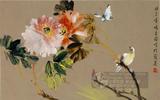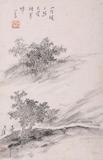明人五王醉歸圖 軸
推薦分享
資源連結
連結到原始資料 (您即將開啟新視窗離開本站)後設資料
- 資料識別:
- 故畫000678N000000000
- 資料類型:
- 類型:繪畫
- 型式:靜態圖像
- 主題與關鍵字:
- 夜景(月景) 燭台.蠟燭 飲食器 傢俱(屏風) 欄杆 庭院 葡萄 梧桐 槐樹 石榴 西瓜 帝王 奇石 侍從(侍女、童僕)
- 出版者:
- 數位化執行單位:國立故宮博物院
- 格式:
- 本幅 116.6x72.5公分、全幅 53公分
- 關聯:
- 石渠寶笈三編(御書房),第七冊,頁3145&*故宮書畫錄(卷五),第三冊,頁501-502&*故宮書畫圖錄,第九冊,頁301-302&*1.本社,〈明人五王醉歸圖〉,《故宮文物月刊》,第36期(1986年3月),封底。 &* 畫五王夜飲,火炬高燒,華宴已闌。一不勝飲而逃,一攬衣衲勸酒,一姬捧水盆侍候。一離席已醉,童子扶掖,二人一立庭間,一挽留,一遜謝。二姬執壺勸酒。男侍持燈籠。畫法清雅。無款印。 &*Five kings are enjoying an envening bout of drinking; the banquet has already run late. One king has had enough and departs, another pulls back a sleeve and urges more merriment as he pours for his friend. A female attendant stands to the side with a basin of water. One king, overcome with wine, stumbles home, a young servant boy propping him up. Two others stand in the garden, one urging the other to stay longer. Two more women attendants hold vases of wine, and a male attendant steadies a lamp. This anonymous painting was painted with a touch of purity and elegance.&*唐玄宗(西元七一二-七五六年在位)少時與四位兄弟(兄宋王、申王,弟岐王、薛王)感情十分和睦,經常相從宴飲,鬥雞擊毬,或出外打獵,或到別墅遊賞。後來他以非長子身份即位,為防範兄弟干政,依群臣的建議,將四位兄弟任命為地方官,分散每年入朝的時間,終至引來岐王謀叛的意圖。此幅畫五位皇子夜宴,或勸酒,或醉而離席,或恭敬道別,重現昔日兄弟歡飲的情景。&*The T’ang emperor Hsüan-tsung (r. 713-756), when younger, was very close with his 4 brothers (Princes Sung and Shen being older, and Princes Ch’i and Hsüeh being younger). They often held banquets, attended cockfights, played ball, went hunting, or traveled their villas. Later, though not the eldest, he assumed the throne. To prevent his brothers from creating trouble, his officials’ advised that he order his brothers to serve as local officials and summon them to court only at different times of the year. This finally led to a plot of rebellion by Prince Ch’i. This is a painting of a banquet of the 5 princes. They are urged to drink, are drunk, getting up, or respectfully departing, making for a recreation of their old days of merriment.
- 管理權:
- 國立故宮博物院
授權聯絡窗口
- 國立故宮博物院圖像授權、出版授權、影音資料授權-申請流程說明
http://www.npm.gov.tw/zh-TW/Article.aspx?sNo=03003061






